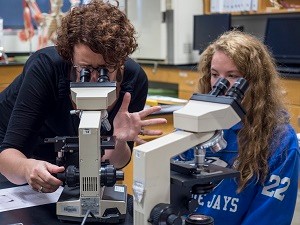
UC Clermont Students Join Worldwide Search for New Antibiotic
UC Clermont College is the first institution in Ohio to join 150 participating schools in 35 states, Puerto Rico and 14 countries in the Small World Initiative. The Small World Initiative was formulated and launched at Yale University in 2012 and uses undergraduate research to tackle the growing problem of antibiotic resistance head-on.
Professor Krista Clark, a cell biologist by training, is helping her introductory biology students participate in a global citizen scientist collaborative effort to discover new antibiotics.
Students participate in a semester-long research project in lab. It begins by isolating bacteria from soil samples taken from their local environments (just one gram of soil, Clark said, can contain anywhere from 4,000 to 40,000 different species of bacteria).
Most of the current antibiotics on the market where originally isolated from soil bacteria, Clark explained, so these bacteria are believed to be a vast untapped resource for new antibiotics. The bacteria that students isolate are screened for their ability to produce antibiotics that are effective against safe relatives of some of the most antibiotic-resistant bacteria faced in healthcare today.
Students then amplify genomic DNA of these antibiotic-producing bacteria to begin the process of identifying the bacterial species. All antibiotic-producing isolates are banked in a worldwide database shared by Small World Initiative participants. They are made available to researchers who may want to expand the analysis of the antibiotic produced or to do further characterization of the bacterial strain itself.
Clark said that this type of research is critical at a time when the medical community is seeing a continual increase in infections that are resistant to traditional antibiotics.
This research could lead to unique antibiotics or variations of existing antibiotics, Clark said. There have been no new types of antibiotics developed in more than 30 years because its not a profitable area of development for drug companies. Were seeing more minor infections that used to be easily treated with antibiotics resist what we currently have available.
Besides being the first step toward possible new life-saving medications, Clark said shes also interested in increasing the opportunity for undergraduate research at UC Clermont. One of my goals in joining the initiative is to get non-majors involved in real science and investigation, Clark said. Implementing research projects like this can inspire students to choose the sciences as a major and down the road, a career.
Tags
Related Stories
UC's record graduating class prepares for next chapter
April 22, 2024
UC will confer degrees to 7,521 degrees to 7,391 students. (Some students are earning multiple degrees.) Both represent new records at UC for a single graduating class dating back two centuries.
UC Clermont to host Rapid Application Events
April 16, 2024
The University of Cincinnati Clermont College will hold four free Rapid Application Events on campus during May and June.
UC President Neville Pinto shares 2024 State of the University...
April 16, 2024
University of Cincinnati President Neville G. Pinto shared his 2024 Sate of the University address with the campus community on April 15.
